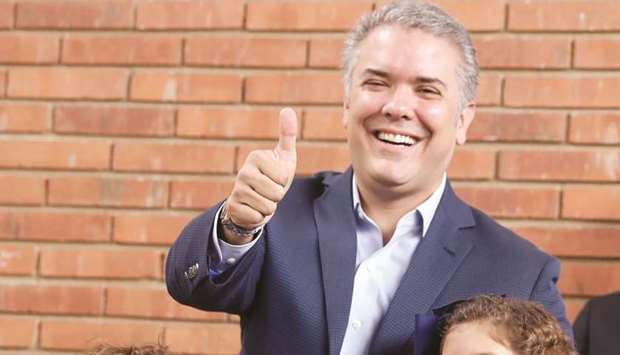Colombians yesterday voted in a deeply divisive presidential runoff with one candidate wanting to alter a fragile peace deal and the other promising to overhaul the economic model.
Ivan Duque, the business-friendly protege of hardline former president Alvaro Uribe, wants to change a peace deal he deems too lenient on Marxist FARC rebels, while keeping Colombia’s largely orthodox economic model.
His rival, leftist former guerrilla Gustavo Petro, has pledged to take on political elites, redistribute land to the poor and gradually eliminate the need for oil and coal in Latin America’s fourth-largest economy.
“We’re between a rock and a hard place,” said financial planner Juan Jose Mojica, 21.”They’re two extremes that could destroy the development that the country has made over the last years.”
From the sweltering Caribbean coast to the frigid heights of the Andes, Colombians voted at some 11,230 polling stations across the nation. The count began after polls closed at 4pm local time (2100 GMT).
These are the first elections since a 2016 peace deal with the Revolutionary Armed Forces of Colombia (Farc), which ended their part in a five-decade conflict that has killed more than 220,000 people and displaced millions.
“I hope all Colombians vote to strengthen our democracy, which guarantees the rights and freedoms of each and every citizen,” President Juan Manuel Santos, who won the 2016 Nobel Peace Prize for his peace efforts, said after voting.
Duque wants to change the accord with tougher punishments for Farc war crimes, while Petro promises to support the existing deal and continue a peace process with the National Liberation Army (ELN) — Colombia’s last active rebel group.
The ELN called a ceasefire during voting and about 157,000 members of the armed forces protected voters during the day.
“This election is so important because it is going to define the future of the country. It’s historic because we have never had a leftist option in the second round,” said Ana Maria Trujillo, a 30-year-old public administrator as she waited in line to vote in Bogota.
A lot is at stake too for Colombia’s $324bn economy.
Duque has promised to keep investors happy by cutting business taxes, bolstering the oil and coal sectors — top exports — and helping manufacturing.
Petro, a one-time member of the now defunct M19 insurgent group and the first leftist to get through to a second round, wants a new economic model that ditches reliance on extractive industries in exchange for renewable energy and a land reform that promotes an increase in productive use.
His policies have prompted rivals to compare him to Venezuela’s former Socialist president Hugo Chavez.
“The markets and the productive sector see Duque as someone who guarantees the continuity of the current economic model, while they see Petro as someone who would break it down,” said Carlos Sepulveda, dean of economics at Rosario University.
State-run oil company Ecopetrol SA is responsible for almost 60% of Colombia’s oil production of around 830,000 barrels per day and operates export pipeline infrastructure.
Petro would shift its emphasis toward wind and solar power.
“I really don’t like either of them, but as I have to choose, it has to be Duque,” said Carlos Mora, a 52-year-old lawyer. “With Petro, I really think we’ll end up like Venezuela.”
Some candidates from the first round have said they do not support either candidate and cast blank ballots — a means for voters to demonstrate dissatisfaction with the contenders.
Sergio Fajardo, nudged into third place by Petro last month, said on Friday neither Petro nor Duque represent a good option. “The blank vote will be higher than usual because the two candidates are from the most extreme positions on right and left, leaving the moderate centrist electorate with no obvious option,” said political analyst Yann Basset.

Presidential candidate Ivan Duque gestures after casting his vote at a polling station, during the presidential election in Bogota, Colombia, yesterday.
